Hoopfellas 2016-17 EL Playoffs Predictions: Why is always Dante..?
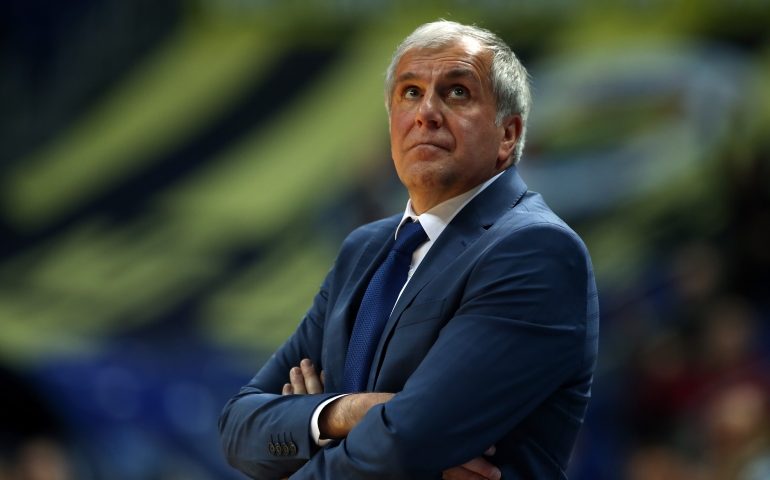
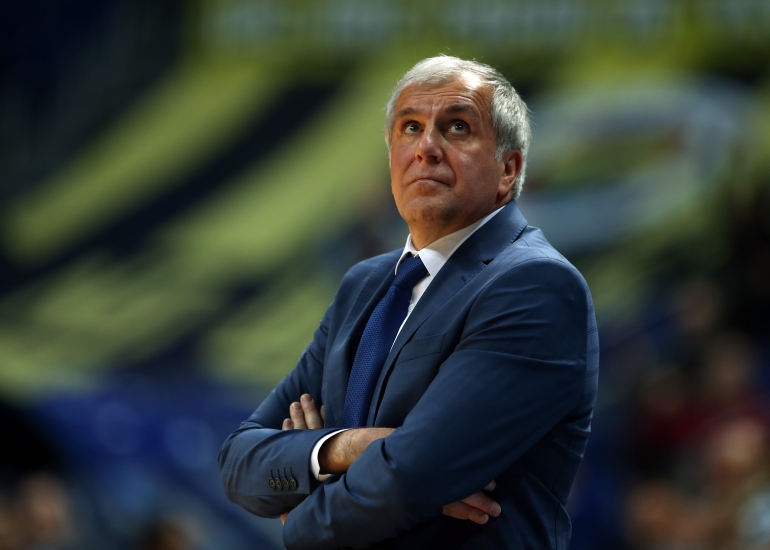
Why is always Zoc…? 700 years ago, Dante Alighieri through his “Divine Comedy” formed the view the world has today on hell. In the new era of European basketball, this capacity is being held by Zeljko Obradovic, as he is the one who has formed its development with his ideas. He is here once more. Hoopfellas opens the gates for a two week stroll around the Euroleague Playoffs with a gigantic post for the four matchups and their predictions. Strictly for those who wake up in the morning and live their day with these games on their mind.
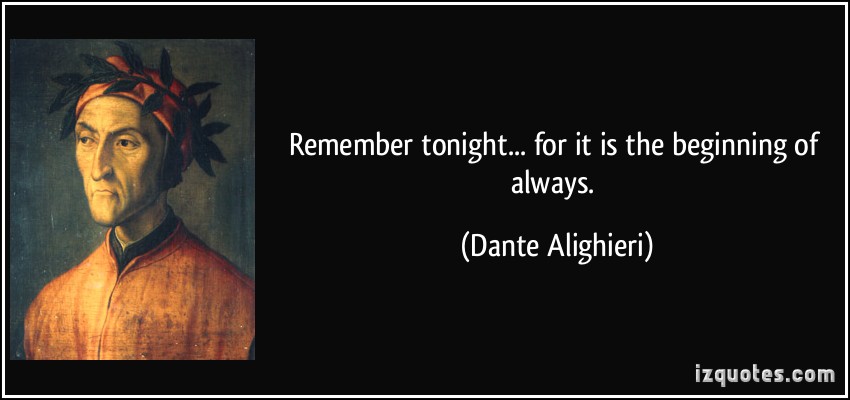
Dante is everywhere; always the pioneer in every development, timeless. His impact is great… Each era studies him with its own tools and asks new questions on his works. The association and the need for the analogy with the great Serbian coach, who is up against one of the two Greek teams on the last round before the Istanbul F4, came to me as a logical extension. In the last spin of the roulette, Zeljko Obradovic, who is always relevant this time of the season, avoided going up against Olympiacos, but will play against Panathinaikos and “sent” the on-form Anadolu of coach Velimir Perasovic to Olympiacos, in a series that is also expected to be super-competitive.
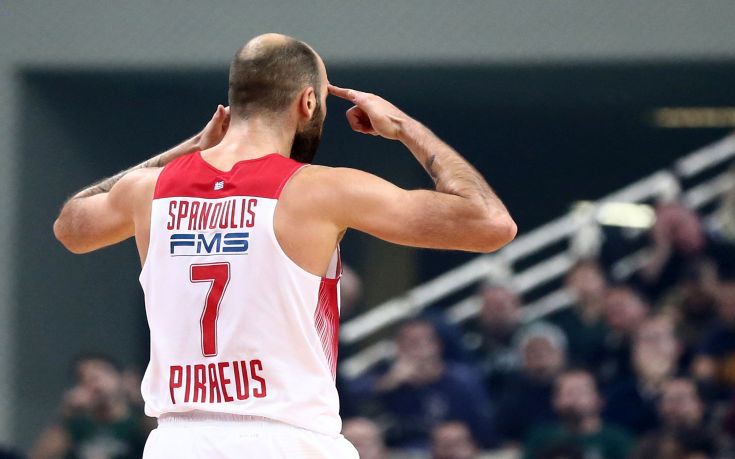
Hoopfellas serves you today, Easter Monday, its analysis of the matchups in a gigantic post (I think it’s the largest one since our blog was created), which I think is worthy of what we will live in the next two (and maybe add some…) weeks.
Darussafaka had trouble with Madrid’s size…
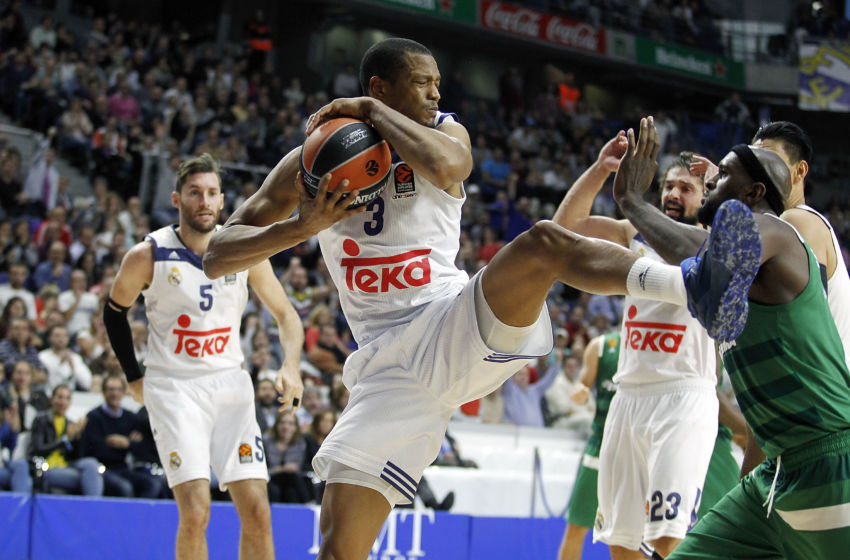
One of the key advantages of this year’s Real Madrid, who were No1 of the regular season, it their size as a team, which I think the Spanish coach will use in this series. Madrid has the ability to play big (Taylor on “2”, big men on “4”, big guards) without losing on quickness and this really posed problems on Darussafaka in the regular season matches. The Turkish team found it difficult to play and finish within the paint of the Spanish team and in general finish on length, and finished the games with 35/83 two-pointers (19/44 in the triumphant game of the first round, which they won 81-68). Blatt faces a great coaching challenge. He knows that he has to find a way to change the balance and play with his opponents’ mind. He is very able when he has to fight under the status of underdog. Very agile… He knows that the first step must be to state that Darussafaka is a contender of the series. Give his opponent the uneasy feeling of battle and delete any chance of an easy win from their mind.
His team now has Zizic in their rotation (and with him the Non-stop motor of a player with his body), but they relied more on the roughness, aggressiveness and the more chances they were given to play slashing basketball that was facilitated by small-ball. The two strong offensive cards the team has, the guard-fighting tank called Wannamaker and the extremely agile (under any circumstances) finisher around the rim called Clyburn, are much more comfortable to go all the way, when their team runs the court. After all, Darussafaka is a team that was built to play one on one. Like their opponents, they play with a low mistake basketball (the way they deploy and execute surely helps) and are able to win any match at any pace.
Driven by this nature of the offense of the Turkish team, coach Laso will draw up his strategy. It is my assessment that he is preparing Taylor’s size and athleticism (this player will be important in the series) for Wannamaker, given that the former Pittsburgh guard may easily go to the rim with his built against any conventional guard. He also has several forwards (Maciulis, Tompkins, Taylor, Randolph, Nocioni, who had an excellent 26-point-match against Sevilla) to spare for the defense on Clyburn, against whom we think, the coach will use size for his final attempts. So, we might see allowing him to take the lane, only to finish on Madrid’s big men, or quite possible choose to “switch”, in order to send on him from the beginning either Hunter or Randolph. The Turkish team will need James Anderson, who has not been there for them (6.8 points, 4/17 two-pointers in the last 5 games), as well as Bertrans (who will also have a defensive role), in order to support the two “pillars” of their offense and the constant duo of Wilbekin (this series will be a big test for his rising status) and Zizic. Madrid surely have more depth and experience at this level. They know that if they open up the pace, over time they will have a statistical advantage. On top of that, this is the most clutch team of the competition, and has a thousand ways to “kill” in the end of a close match. Arrows (Caroll is in great form), riddles and mind (Donsic), class (Randolph), and all these together in the form of the thunder (Llull).
Madrid is ready for a Match up zone defence, Blatt is ready for Madrid to be ready…
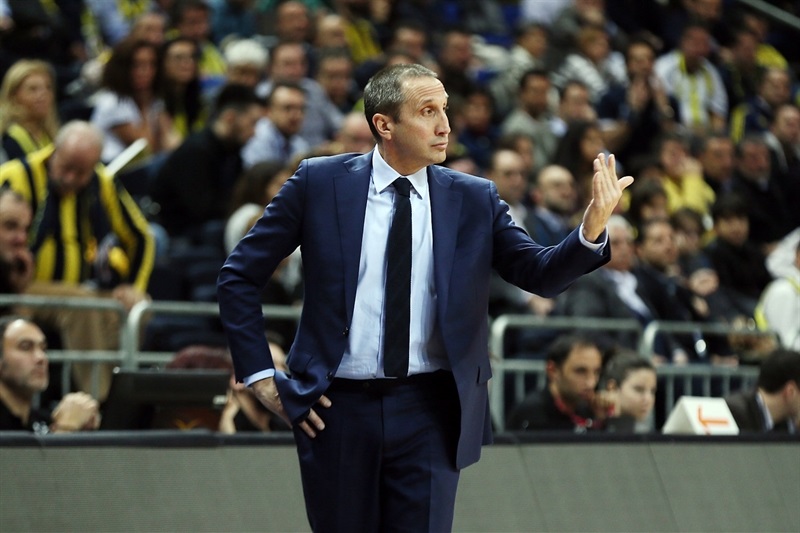
The other night I tried to put myself in Blatt’s place and create a matchup zone, by covering one by one the recorded situations in Pascual’s playbook, and I have to say that while in the beginning the whole thing looked addictive, the deeper I went I found myself in a dead end, when I realised the combinations Madrid is able to come up with, even if you manage to “deactivate” their important units.
It is my assessment that the Turkish team will adjust to Madrid’s offensive playbook from time to time. I think that coach Blatt, against the High-Low situations (against a matchup zone) the Madrid team play, will instruct his big men (the PF and C that are on the court) to play man to man On the overload Madrid usually play with a baseline cut by Caroll on the ball side corner, the player guarding him (Batuk, this is who I think Blatt is preparing for the Mormon guard) will follow him until he gets to the forward (usually the “4”) and deliver him there with Moerman/Clyburn staying on the gun from Utah in the corner. It is very important how Blatt will manage the trapping chances this defense gives him, either with the ball on the corners or to disrupt the dribble penetration. Also, affecting the lines of communication (with a pass) of Madrid and the execution on their offense will be of even greater importance (it is possible that Madrid will go to quick shots, it’s not unusual for them). This won’t be easy, as this is a team with Donsic, Llull and big men like Randolph in their roster. However, if they manage to do that, they will have accomplished a great goal. They key will be the loneliness of the player that will be on the last line of defense with the mission to run the base line. He will need quick feet, size, athleticism and IQ. Looking at Darussafaka’s roster, it is Clyburn that has the entire athletic package to be the last player on this defence (even to defend one on one against Randolph), however, don’t be surprised if we see (the more intelligent) Wannamaker there. Coach Perasovic (who has Honey cut on his team) had put Granger on the last line against Olympiacos.
All in all, I think that such a defence may operate as a means to change things within the game, as over time Madrid has the quality to decode it and start executing against that defence. Be sure that coach Blatt deeply knows one thing and it is on that thing he will spend much of his time until the start of the first game: The only chance Darussafaka has in this series is directly related with their defensive performance. The Turkish team must lower the “Queens”’s percentages and their productivity. They will need a defensive masterpiece from their coach… So, 1-3-1 (cross…) defence may have two faces when playing against such a versatile offence…
Prediction
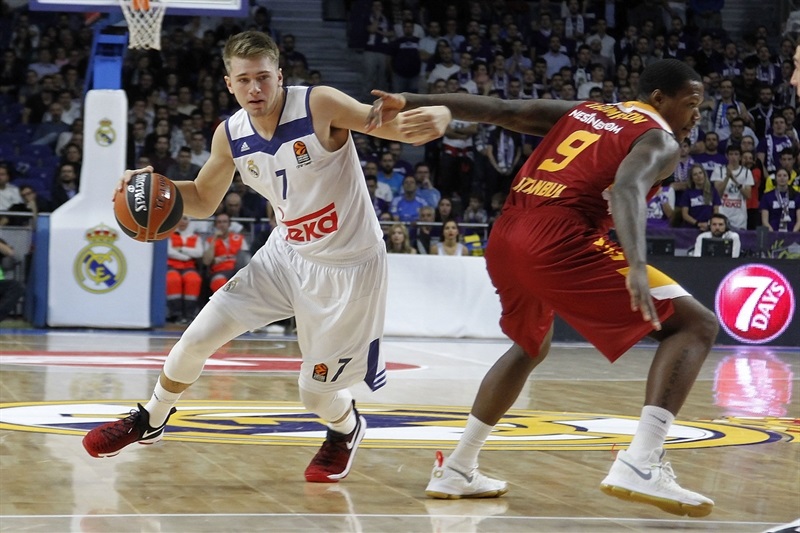
I have the utmost respect for coach Blatt. I can honestly say that nothing (absolutely nothing) seems impossible/unachievable for this coach, who has proven that he can mentally go very deep and bring the series exactly where he wants. However, he is up against a team with strong mental toughness, which (apart from their superiority in depth and quality), in conjunction with their experience, give them a strong advantage. It is important that the Madrid role players have been performing well lately. The 5 matches look like the best the Turkish team can do, as logic implies that Real Madrid will win earlier. 63-37% for Madrid…
Baskonia is lacking on perception
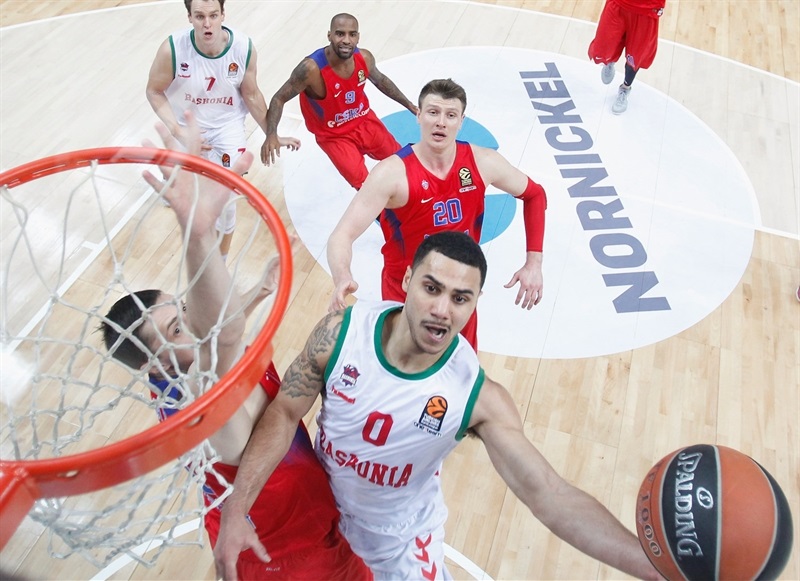
In my opinion, this is the main disadvantage of the Basques in the series, even bigger than the difference in quality in favour of the “Bear”. Against such a strong opponent there is a bigger chance of getting disappointed or finding it much harder to come back from behind in a difficult situation. If they hit a wall, it will be hard for them.
On the other hand, regarding their mental background I have to add something that has not left my mind and we should keep in mind for the final stretch of the season. CSKA has improved in mental toughness and management of situations in decisive games (although they never have problems in the playoffs, quite the contrary), but I still don’t think they have completely overcome this and built a strong character. I am mentioning this, because this is a playoff series where there is always the possibility to have to play a no-tomorrow match (especially if this is at home, things will be even more difficult for CSKA). The “Bear” does not function with a robotic precision when you get in their head. They have not put that behind them completely. I have the feeling that there are still times when they look scared, behind their shoulder…
Adjustments
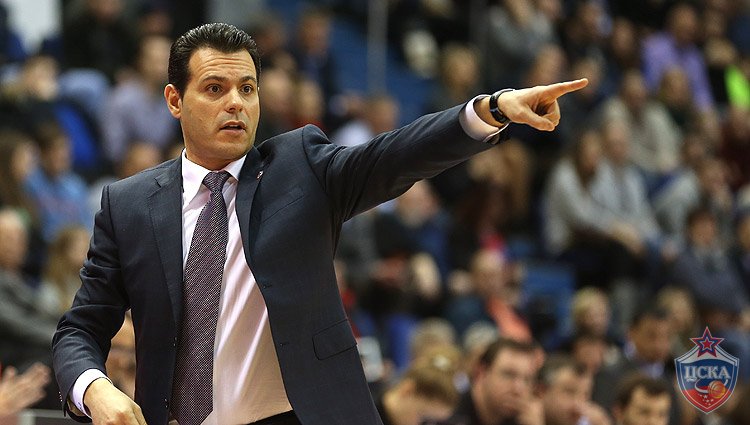
I believe that both coaches will have prepared things to stop their opponents’ main weapons. Maybe CSKA’s good defenders will be the ones to decide the series. Itoudis has Jackson (a very experienced player who has successfully defended against great players mainly using his quick limbs) to guard to Baskonia leader, Shane Larkin, and the “wild card” Higgins, who can defends both positions of the backcourt (Beaubois, Larkin), apart from the “3” (Hanga). The trio of Hines-Vorontsevic-Kurbanov is the backbone of the new basketball style the compact CSKA has chosen in the Itoudis era, as these players are multiple defenders with excellent positioning that know how to “lock” the paint regardless of the size or abilities of the opponent. These are the five players that are the “armour” of CSKA and Teodosic-De Colo, and do all the work when the two experts recite poetry and get the ovations. Emphasis on the role and quality of these role players, combined with the cohesiveness are the elements that make this team look so good.
The “one gear and automated execution” basketball as a means to lead to the win, regardless of the opponent and the environment, played by Sito Alonso goes up against a (more) intelligent team with very developed perception. CSKA plays at the highest pace in the competition and this means that Baskonia will be against a type of basketball they are used to. Of course, the same goes for their opponent…
I am waiting to see how Sito will use Hanga on the defensive end. Will he leave him on Kurbanov and allow him to be a “wild card”, thus making it easier for him to help in the final attempt (it is expected of the Russians to respond with a small lineup, Higgins on “3”, or three guards) or will he put him up in the first line against Teodosic-De Colo (which automatically means post offense with Kurbanov for the champions)? I also think that Itoudis will go for the scorers in his offence in order to wear them down in many levels. The champions’ forwards (plus Hines) have the skills to control, in the better part of the series, Shengeila, whose performance will be decisive for the Basques. I believe that CSKA’s coaching staff will spend much time in preparing their transition defence, which may be the decisive factor of the series.
Alonso knows that him team must be pluralistic and wait for a boost from the supporting cast of Budinger, Diop, Tille, who are currently in good condition. Without their support, no one can beat CSKA at Moscow. Baskonia’s strong card is rebounding. They have the players to win the battle of the skies and change things around, with rebounding as the point of reference.
CSKA’s unbeatable Running Hand Off
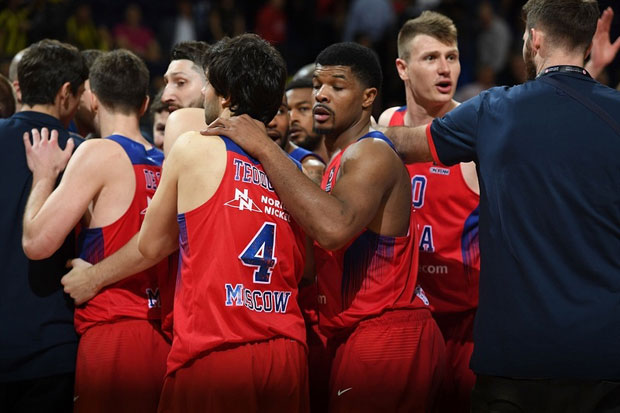
I think Dimitris Itoudis knows he is up against a great offensive mind in the battle of the benches for this series. Sito was a student of Aito, he studied at the Reneses Academy “quick deployment and automated execution”, and has added his own ideas, which has led us to one of the most interesting offensive playbooks of current European basketball. Given that CSKA bets hard on their defensive performance in the final stage of the season, starting from the playoffs. In many plays Baskonia use their Blind (back) screens, part of the screen the screener situation chain they use in order to clear the paint in the middle lane. CSKA will of course want to determine the final execution by directing the ball on their best defender in these situations. And, believe me, with Hines-Kurbanov, they have the ability to “lock down” most teams in the middle lane. Of course Larkin is not your run of the mill player. Alonso usually uses Horns offence as an entry pass for the 1-3-1 and bets on Flex and the pillars Larkin-Voightman. The strongest part of Baskonia’s offence comes when the ball is in the low post (the good passer Voightman or Shengeila) and has to do with the way the team works on the Weak and the Strong Side, especially with an excellent player on this like Beaubois in order to produce easy scoring with cuts directly in the heart of the paint or unguarded shots. I have to reiterate that they use this nearly perfect and that’s why the Russian defence away from the ball will be important.
On the other hand CSKA’s Running Hand Off is one of the most spectacular half court plays in European basketball with the way Teodosic and De Colo apply it in the court. Immediate change of A-Set to 3-2 format aiming at putting one of the two “magicians” quickly in the main lane and setting up mid PnR. This is the epitome of “I know what you are about to do, but I don’t know how to stop it…” as the multi-talented players make this situation unstoppable…
Prediction
CSKA is a team that knows how to play these matches. Basically they are a team that do it better than anyone (believe me if this system replaced the F4, it would be much more difficult to beat them…). Baskonia has the talent and the basketball they represent has helped them form the No Fear character that has been in the core of the club anyway, but in order to beat the “Bear”, brute force is not enough. A sharp mind and “Machiavellian ” cunning is needed. I will go against the stream of most Europeans, as I think that there is bigger chance for Real Madrid (not necessarily in wins, but mainly the way they play) to face bigger problems in relation to what CSKA will come up in the battle against the Basques. I am expecting the champions to clear the series in the second week of the playoffs. 66-34% in favour of CSKA…
The main creators on defence.
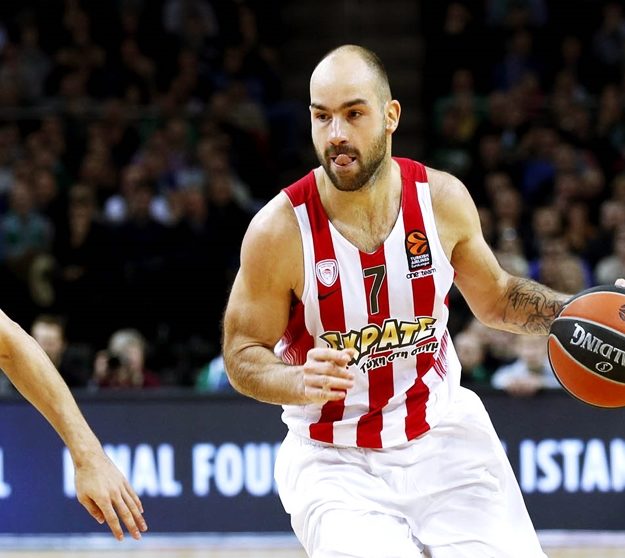
An important decision coach Sfairopoulos has to make is what he will do with Spanoulis on the defensive end. One on one defense in the low post or helping and defensive rotations? Olympiacos is a team with quickness and size. They have the ability to keep the rotation times low in units that do not give one inch in height. Their last outing against Anadolu showed that they may need to play with defensive helping when Spanoulis is in miss matches. It is my humble opinion that they must be selective in this. First of all weigh in the data and then adjust. Coach Perasovic will try to attack on the Reds captain. Close outs with Osman-Paul. Post ups with Honeycutt, Isolations with Granger, either face up or post up. He wants to wear him down. Either way, Olympiacos’ units will lead him to attack on him… I think the key for this choice is Heurtel’s presence (or lack thereof) for Anadolu. He is great in reading the opponent’s defence in situations with an extra player, he can move the ball very effectively from one side to the other and execute form any range, as well as after dribbling. Without him, Anadolu are more robotic, in every sense (more efficient defence, more team work on offence, less creative). Coach Perasovic is still trying to find the happy medium. Last summer I had expressed my opinion and I had encouraged the Croatian coach to follow coach Itoudis’ path with Tedosic (6th player) and hand over the key to the High-IQ economy game of Granger. So, when Anadolu decided that they must start from defence (Granger-Balbay in the starting backcourt), they started the streak that gave them the sixth place in the rankings.
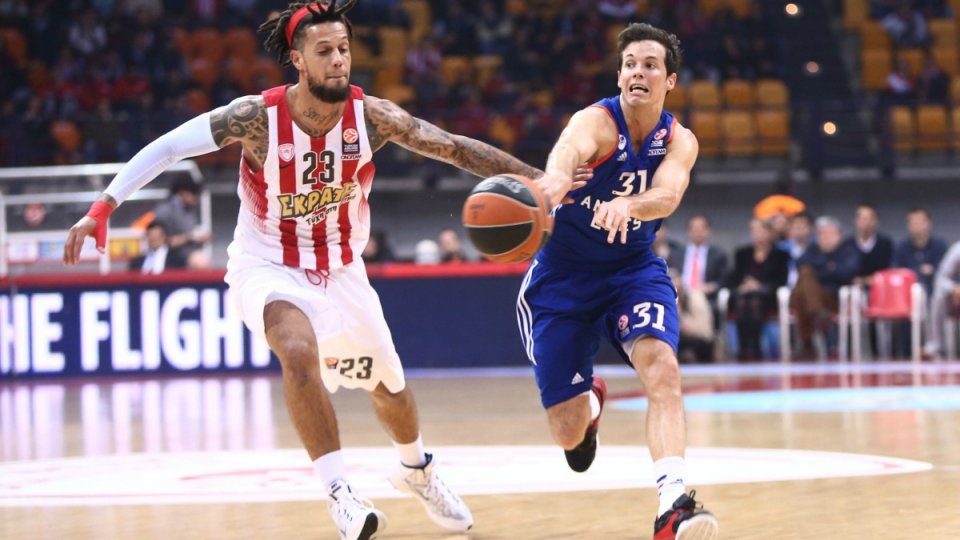
Perasovic will have the same concerns with Heurtel, who is even weaker on defense. Olympiacos will use that with patience and persistence, that’s for sure. The French PG is the weak link in Anadolu’s defensive performance and one of the main reasons their coach changed course in his rotation’s management. The guard that will go up against Olympiacos’ offence will have to be aggressive in order to wear him down in many levels.
Olympiacos’ stamina and motor will be the decisive factors in this series.
It’s a fact that Olympiacos must be completely different from the team we saw in the finale of the regular season in order to be able to go to Istanbul. That’s a fact. They will be up against a team that is in great form and has been constantly playing better, which is obvious in the way they execute actions on defence and offence, compared to what we had seen in the past. Anadolu is a young team that is excellent in running the court. When they improved on team defence (they were quite poor and had a low team cohesiveness in the beginning of the season, when they were trying to find the balance between fast pace and defensive efficiency), they started playing better. The ace up their sleeve in their offensive assessment is the excellent AST/TO ratio (No3 in the league).
Regardless of their FG percentage and their own AST/TO ratio. Olympiacos must be ready to bring in their best possible effort in this series, mainly on defense. I am going to break it down: they must have a great defensive series and start their effort to advance from there. Last month’s Olympiacos will not be able to stand head to head with Anadolu. They must show us something different. Starting from Birch and Mantzaris’ spot shooting and the moving on to the “aggressiveness” the team must have in every aspect. This is a one way street, it is not negotiable. This effort will not need analysis or much talking. You will feel it on the court. It will go through your TVs and will find you when watching the first possessions. Olympiacos must fire up their fans from their defence and then, believe me, against this year’s Anadolu (they are average in their rotations, despite their athleticism, which shows lack in concentration), the offence will follow. Lineups like the two “Pap” together as wings (especially when Paul is in two-guard lineups) may work towards this direction.
3-2 Offense
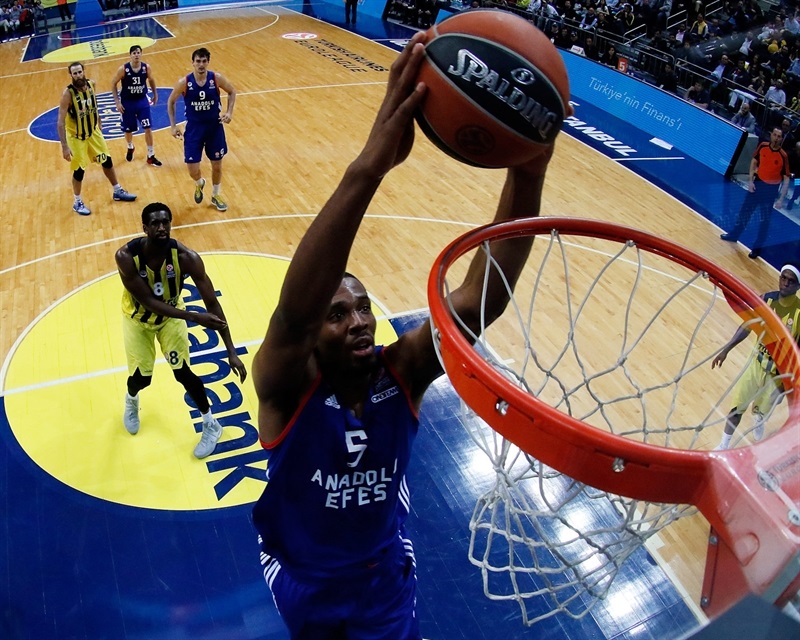
In most of the season we saw Anadolu run with different entry plays, so they would be less easily read, sets from 3-2 formation quite successfully. Maybe the entire projects looked a bit old fashioned, but it turned out that it could work, with Perasovic aiming at the best possible spacing and the ability to play each player on his strong points. The heart of this offence was the Turkish team’s effort to bring Dunston and Brown to work together in two-two situations, either for Double low post formation, or later in High/Low (which turned into 1-3-1), by using their ability to pass the ball. There are certain situations (which come into effect when they play with 2-guard lineups) where Dunston (him and Granger are the best screeners on the team) sets up 3 or 4 screens in a row, running the main lane up and down (which is not easy at all, it requires a good physical conditions to finish the play) in order for his team to enter the final step of the PnR with the optimum conditions. In total, coach Perasovic preaches “maximize space” and tries to create the less possible traffic in the paint by setting up back cuts for his quick forwards with the guards being the screeners. Derrick Brown will be a great factor for this matchup. He is playing quite well lately and led Anadolu’s “comeback”. Brown gives his team a sense of athletic supremacy over most of their opponents. Coach Perasovic has given him the ball (ok, Duda did it first with his model being the creative PF- Nemanja Bjelica and the Serbian national team) and the freedom to put the ball on the court and take the main lane as the main ballhandler in transition offence.
Note: It is understandable that it will be a crime if the Reds allow him to dribble in the middle lane up to their rim. Anadolu must see the coast to coast of the Xavier forward again in the TBL playoffs…
Olympiacos has players to guard him. The key is to put pressure on him. To feel you and your body, as well as your ready feet. You can only beat Brown low, when defending on the court. It is extremely difficult to guard him up high. For example, the Olympiacos forwards (Printezis, Papapetrou, Papanikolaou, Agravanis) must battle through the cross screens given to the American player in the base line and not allow him to get the ball without a fight on the wing. Physical approach, correct fouls total discipline in the box outs against Honeycut (mainly him), Dunston (2.8 offensive rebounds on average), Brown. Kirk’s abscence in the last game in a way showed Perasovic how to play small ball with Brown at the “5” position, which was a lineup Olympiacos found difficult to adjust. This is why it’s important for Birch to play well in these games…
Good news: Anadolu’s offence (one of the most productive offences in this year’s Euroleague) is not actually really efficient.
This has to do with the nature of their offence. They have two Face up forwards (Brown, Thomas) for whom they set up lots of isos high on the wings and two guards (Heurtel, Granger, great creators, primary ballhandlers in their offence), who are used to midrange shots after dribbling, which means several Long twos, the most inefficient shot in modern basketball according to the… scriptures of advance stats. Is this what really happens, though? I say no. It depends on how you include this skill when structuring your offence. Let me remind you how important PnR guards that can also shoot after dribbling (e.g. Sloukas) are in this level today.
So, it is my opinion that this trend in the Turkish team’s offence may be a good asset, and may show the way on how the Greek team will play on defence in this series. Anadolu is a team with low percentages from perimeter shooting. Their eFG% (Effective FG Precentage, an index that evaluates your execution and rewards the difficulty a three point shot has) is very low (50.9%), 15th in the league, despite their offensive talent, the only team that was worse was Cverna Zvedza). We all felt the Reds problem against a team with a high percentage in this evaluation index.
Olympiacos is maybe the team with the best post defence this year. Birch-Papanikolaou-Mantzaris set up a wall and make the post up balls end up in something like a black hole. However, what we need to point out in the statistics of the Olympiacos defence is the 14.6 assists the Greek champions allow their opponents (the least in the Euroleague) and the 43.7% of the FG% they allow their opponents (also No in the league). These can be very well interpreted against a team like Anadolu, but it is essential to also take into consideration factors such as the physical/athletic part, as Olympiacos (Hackett-less and with Birch struggling) is not exactly the well-trained team we saw in the beginning and the better part of the season. This is why I pointed out stamina above…
Lojeski’s absence is a matter of concern.
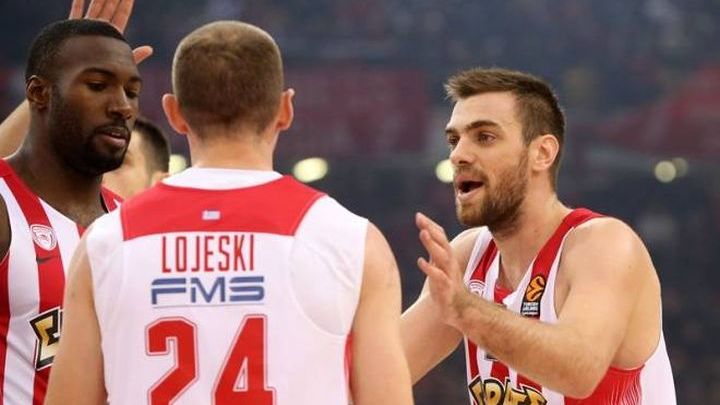
Let’s be honest, this is a very important factor. Without Lojeski, Olympiacos doesn’t have the same productive ability and mainly does not put the same pressure on the defences that can concentrate on the main lane and Spanoulis-Printezis. The Reds have added a good shooter this year, Green, but, in order to be as productive from the weak side, they have to “loose” in backcourt defence and play with Spanoulis as the main ballhandler and Green on the weak side, which is a role in which Lojeski (given his ability to attack close outs) was very successful. Suddenly, Olympiacos’ productive capacity has changed and Anadolu seem like they are much better in this part. This is why Olympiacos’ main goal must be to play their game. Set plays, controlled pace through defensive rebounding and defensive readiness in transition, “valuing possessions” basketball, effort to immediately turn defence into offence when the timing is right, in order to make up for some of Lojeski’s scoring.
Hackett’s gritty game (it fits like a glove against such an opponent) and Lojeski’s instant offence that gave another nature to Olympiacos’ second unit will not be a factor. Olympiacos will need an extra player in the series…
Who will be the extra player…?
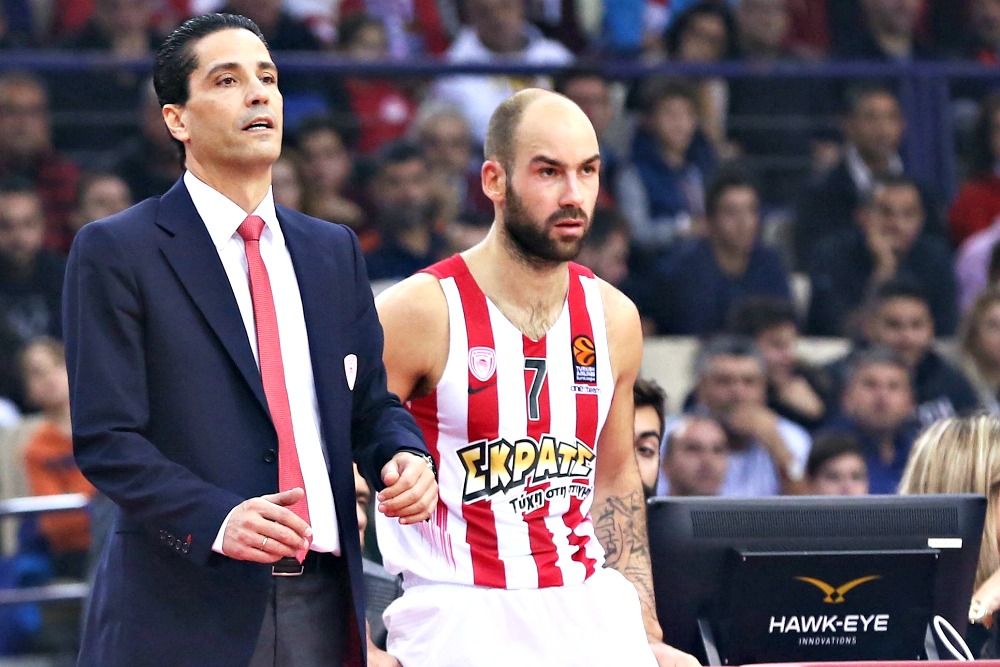
We may take it for granted after all these years, but the core of Spanoulis-Printezis is (also taking into account the chemistry between them) a very rare thing for Europe. It is what gives Olympiacos their status, in case they find themselves at Istanbul for two games with no tomorrow. Anadolu has several very good individual defenders to guard them (Granger, Honeycutt), but they do not work well as a team, despite their improvement; their team defense has weaknesses that led them to have the second highest (after Armani Milan, which is not to brag) FG% for opponent offense (49.3%). Keep in mind the Reds ability to get fouled (No2 on the league, behind CSKA), which may prove to be important for this series.
Coach Perasovic does not hesitate to take risks. For example, it would not be strange to see a 1-3-1 zone defence with Granger taking the last line sprints. Or gambling in the same formation with trapping in order to get 2-3 possessions and change the momentum.
Coach Sfairopoulos needs an extra player, who will change things and the team’s internal world. He will give the team the freshness needed to successfully adjust in order to advance. Maybe this player will be Waters (midrange, competitive mentality) or Young. The deep rotation of the “5” positions may be risky, even though I think that the coach will wait to see how his big men enter the series and decide accordingly.
With Lojeski injured, a key player for the Reds will definitely be Green, whose performance will be decisive for the series. He must be ready to score important shots, and mainly do it in the final minutes of games, when the ball will probably be in the hands of Spanoulis. Green having a productive series, maintaining his aggressive character and connecting with the basket is as important as Birch going back to the defensive status he had in the beginning of the season (scoring on him looked like an impossibility). For the Virginia Tech graduate this series may be a point of reference for his career. Behind Green’s big shots that will cause a delirium of excitement to the Reds fans, the image of Bosporus may rise…
Prediction
It goes without saying that all results are open. Anadolu is in great shape and is playing wonderful basketball, however “pretty village, pretty flame”, as the fact that they are better in certain part of the game does not secure the required emotional intelligence for this test. This is where the Greek team is better. Olympiacos are able to lose at home and win on the road with the same ease. Even if the series is long (which is quite possible) I give them more chances to come out as the winner… 55-45% in favour of Olympiacos…
Prophecy of illusion…?
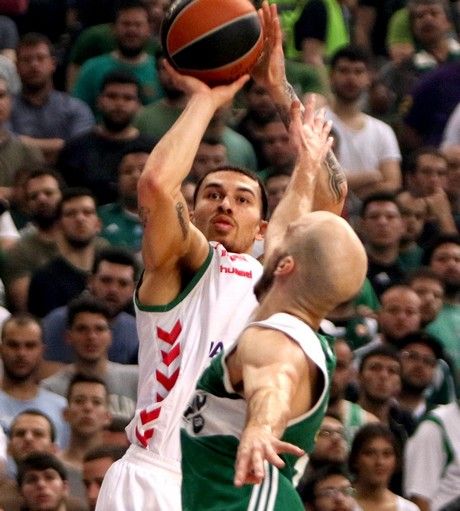
This is something that we talked about last summer and discussed it with a Spanish associate late last night. After Mike James moved to OAKA, and with the fact that Calathes was already there as the leader, and with the memories of the traumatic experience against Baskonia in last year’s playoffs, our page created a picture of Panathinaikos in the spring. The concept was based on the existence of two robotic guards with endless energy sources (Calathes-James), who would continue to play to their limits until the end of the season without rest and give the team a non-stop motor nature (both in defence and offence), which the opponent would be hard to follow, with last year’s Baskonia being the model…
Are there common elements between last year’s Baskonia -Panathinaikos series and this year’s Panathinaikos-Fener series? Basically the series is quite different in regard to the nature of both teams; however, taking a closer look, it is clear that the team that has the home court disadvantage and relies on half court cooperation (Panathinaikos last year, Fener this year) is entering the playoffs with the help (?) of the general feeling (see specialist predictions) that they would be able to break the a strong home court (OAKA this year, Buesa Arena last year) against a team that has great physical condition and through their efficiency has built a winning mentality in games that are decided by details. Last year this belief proved to be fake as the Basque team’s running and their supremacy in the athletic part was unmanageable for the Greens’ mind. Of course this year there is also the Zoc factor. There also is a team (Fener) that on one hand is tired, on the other, they are much more ready than last year’s Panathinaikos to play matches like these. The series will show us if a correlation exists. Will the Greek team’s choice to absorb elements of their last year nemesis in a different environment be justified? We just keep that in mind as we enter this year’s most talked about series…
The Read & React by Obradovic: the riddle that must be solved by Pascual…
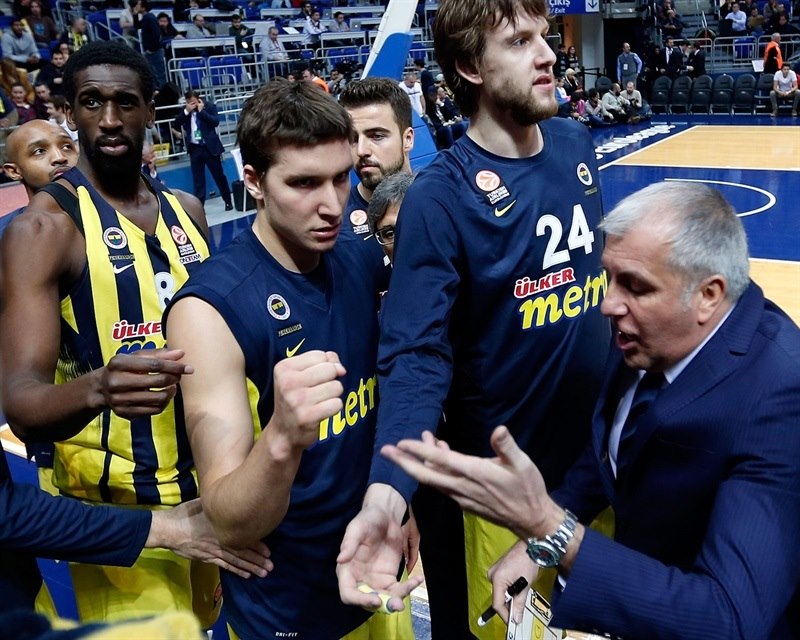
The 2-3 Motion offence that covers a big part of Fener’s offensive playbook (and is directly linked to the Turkish team’s small backcourt rotation), for which we have talked about numerous times in the last years, in my opinion is included in the Read & React offences, mainly based on its operation, not its structural objectives, which approach more an old fashioned motion offense. This choice is a means of expression for Fener in their effort to present a different, special profile, by capitalising on their size and tendency to play Big, matching the lack of a great slasher from their roster. Especially when (with Bogdanovic injured) the Turkish team was made to play with only one guard in their lineup, this direction (in the final seconds the decision of the player that has the ball determines the movement of the other four players, who in essence act as reactors) helped them. The aim of Obradovic’s offensive philosophy is to produce High percentage inside shots, so Fener is very threatening from within 3.5-5 meters (post ups, lay ups, free throws), and this is their deadly zone.
In reality the pressure this offensive direction puts on the opponents’ paint is responsible for their ability to produce good shots from behind the arc (38.3%, 6th in the league). However, as we have repeatedly pointed out, it is an offense through which they can control the pace in order to set the court and impose themselves with their size and correct operation.
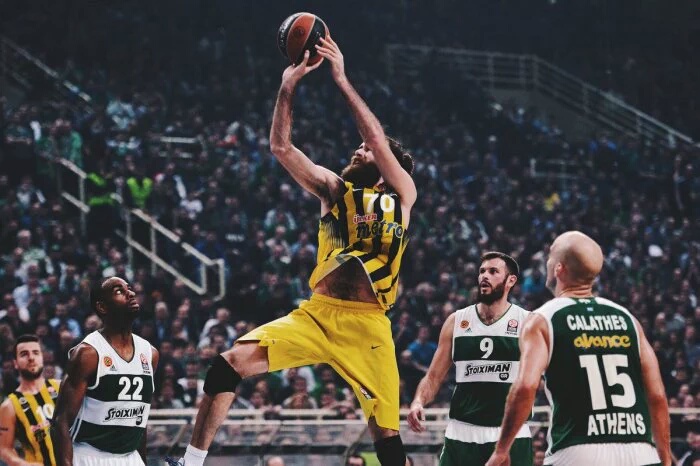
The 2-3 Low Offense they play is a great example. Obradovic has found success through it with Gaggle Post execution, where Vessely gives a cross screen along the base line on the weak side and turns and posts on the strong side by taking with him the player that has switched. Panathinaikos must be very careful how they behave here. Their 2-1-2 also includes Read & React; however the screener that gives the blind screen in the main lane reads the first reflex response of the defence on the High PnR and gives the screen in essence showing to the ballhandler the player who will execute (the ballhandler himself or the big man that rolls). Much attention must be given to the way the Turkish team create through post ups. When the ball is low (the big man as the main expression of their transition offense or Datome in a 1-3-1 format) they work well the high Flares (for Dixon or Mahmutoglou) in order to find a shot or for distraction or in order to use the main lane to execute, especially in transition (Udoh with the ball in the post, Vessely giving a back screen to Datome, Nunnaly in the main lane and pass for midrange from the free throw line, CSKA used a step back-fight through when the backcourt players stayed under the rim in the screen process with Hines controlling the movement in the high post).It is also a fact that once Bouroussis gets in the court, we will see a typical hand-off that ends up in pick-n-roll in the middle lane. I think this is where they will aim constantly. In total, their offense is better than what their numbers show. They have a high TS% (57.5%) and rely on communication and cooperation; this did not work for them well during the long absence of their most important player, Bogdan Bogdanovic…
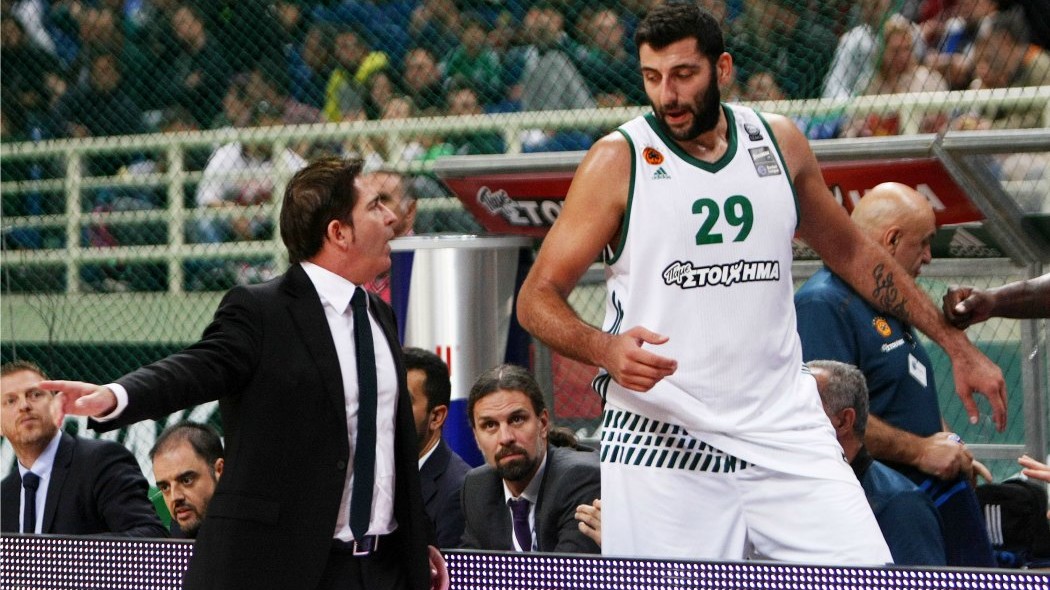
Coach Pascual is inventive and always prepares things, which is what a real coach does and the team will look for him for this series. The fact that the Greens have a coach in their bench that may come up with a play under pressure or create a trick that will change the momentum is of great importance. Remember the game of the two teams at OAKA and the 1-2-2 defence.
“Xavi Pascual started the game with a “trick” in order to take control of the game, a 1-2-2 zone defence with the long and athletic Singleton on the “top”. In its core, this defence requires the two low post players, among others, to go after the corner shots and that is why the Spanish coach chose the duo of Nichols-Gabriel to defend low This is a defence, whose main goal is to prevent the entry pass to the post (mainly the High Post, as if that happens if can be opened up easily) and helps defend against peripheral execution, whereas it give opportunities for trapping that may lead to fast breaks (one more reason to play your PG on the wing and your long/athletic player on the top), which Panathinaikos greatly needed against such an opponent. Of course Fener read that. Obradovic is too smart to fall into that trap. Against a 1-2-2 Fener is really dangerous when Udoh (who is able to both pass and shoot from 5 metres) plays in the High Post (and Vessely in the low post) in order to open up the choices if the ball gets to the free throw line. They broke that on their second possession by giving the ball to Datome on the wing”.
With Gist available, a defence like that may be used. The defence Panathinaikos play in the entry pass of Fener in the post will be a key part for them on the defensive end. To me this is the most important tactic of the “Clover”. Let me remind you of the 3 periods of Olympiacos in the game against the Turkish team at Faliro. Something like that…
Individual management.
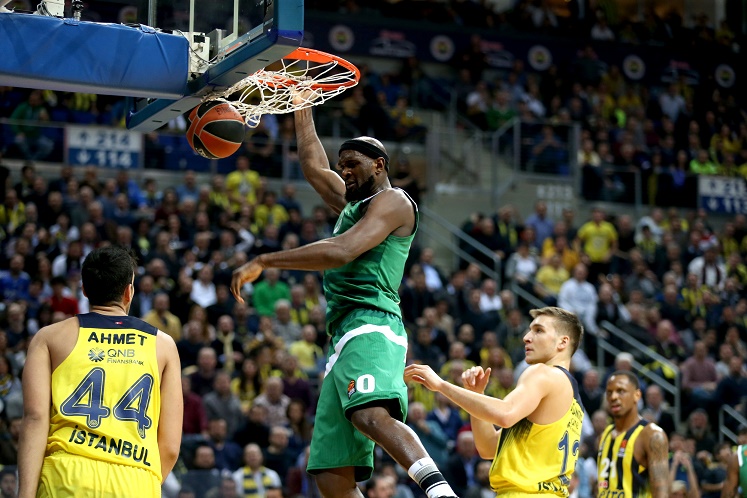
Panathinaikos has the defensive tools to match Fener. They are the most athletic team on the court. Calathes has been proven to be the “wicked witch” for Sloukas-Dixon (he will be an alternative for Bogdanovic, on whom he might gradually try to play “deny” defence), Pappas and Rivers are both quite physical to stay with the wings (Bogdanovic is a great challenge for Pappas, a matchup I want to see) and the frontcourt Americans may produce plays that will lead to instant offence. It’s a fact that the Greek team will look to score in the open court after defences, especially in the OAKA matches by taking advantage of their depth in order to put the pressure on and be physical. The Low Pace character is the rule and the safe environment for both teams (68.9 Pace for Fener, 69.5 for Panathinaikos) .What concerns me is the management, not in the direction from the bench, but of individual players. I am talking about how certain players will manage themselves and the goals their team set against a team that will aim to wear them down. For example two quick fouls by Gist or Singleton (he is the player with the highest average in fouls committed in the league, 3.23 per game) may shift the balance immediately. On the other end of the court it will be interesting to see how Bouroussis and Singleton will be able to wear down their opponents.
“Panathinaikos is the only team that has two players in the top 10 players in the fouls won category, as Singleton is just below Bouroussis. Both of them are also in the top 10 players with most free throws, and have a great percentage there, 78.5% for Bouroussis, 73.9 for Singleton”
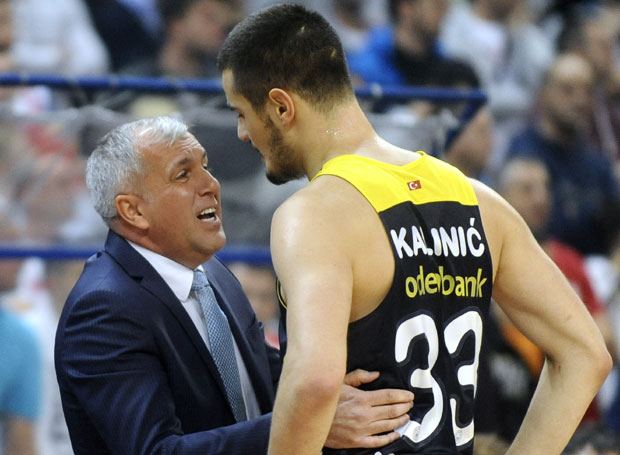
Obradovic knows better than anyone how to use his role players to boost his team in such series, by using them in special roles in order to gain something each time. Of course the rotation this year is more set. Kalinic will be important for his defensive tactics. It won’t be strange to me to see him on Singleton (Antic will struggle) for a long period or in the “head” against Calathes. Bennet may be the “shield” for the duo of Udoh-Vessely and absorb some fouls. Nunnaly may also guard Calathes or go after Rivers. Datome’s close out offence is strong card (the Greens must get between the passing lanes and make their opponents hesitate in the communication between strong-weak side, which moves the defence, the part where they are the strongest). Panathinaikos’ outside shooting percentage will me a major factor (against a defence that does not allow good looks from behind the arc and allow for a few assists, which will be important for a series that is expected to be close).
The Answer
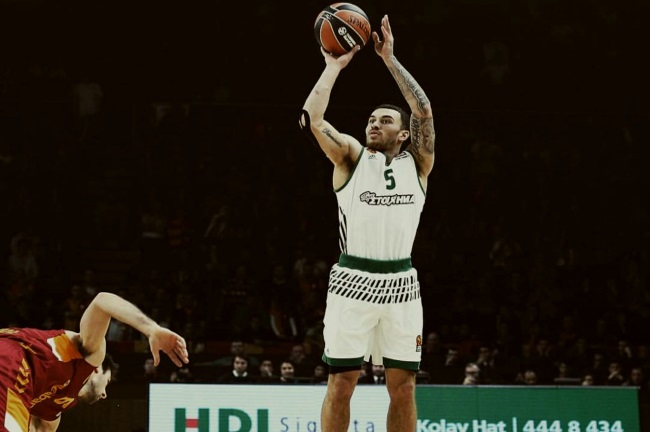
The trio of James-Singleton-Rivers has carried the Greens offence for the entire season and defences have found it difficult to match their pluralism, especially the ability of the first two in one-on-one plays. Filtering the Greens’ specifications in scoring against a quality defence that is traditionally very well prepared, has a wide range of choices, and is able to quickly decode and adjust, such as Fener’s, we come to the conclusion that the answer may be one: Mike James. This must be his series, if the Greek team wants to overcome Fener. The nature of the games suggests using James a lot. And the battle to come, with him being the key player, will be of great interest.
James came to OAKA to open up paths in the offensive end where these paths are not even visible. He has been very constant in this throughout the season, and has confirmed his label as one of the best one on one players in European basketball today. His running floaters are infallible. His step back jumpers are buried in the bucket with great accuracy. His 58.5% percentage in 6.2 attempts for two-pointers per match for a player of his body type, would make Tony Parker jealous. Panathinaikos will need James a lot in this series. Fener is a team that knows how to direct the ball with their defence (this interpretation may be ambiguous against teams that don’t hesitate to insert an extra dribble and have the one on one ability and talented scorers) and at the same time is able to defend at the three point line, which comes as a result of their automated processes and the readiness they have developed, after 4 years of Obradovic being on their bench. They also like to use switches, especially in the main lane and the final stretch of their possession, by locking the execution of their opponent on the player they themselves want; the size of their mobile big men helps. In close matches, where the rule is that one on one is where the teams go, this counts in the last possessions. However, this year they are not as efficient in these types of defences, and they have been hurt by conceding several points from the middle lane. I also expect that the Obradovic’s choice of a short rotation has hurt the team in regards to their strengths and individual defence, and this has been demonstrated in certain cases in Vessely’s behaviour, who has great motor and used to be impenetrable.
I believe that Xavi Pascual will possibly use the 1-4 High Stack offence we saw from Panathinaikos more in the beginning of the season, aiming to “stretch” a long-sized defence in half court, by creating spaces in the paint for drives by Calathes (remember that in the match in Istanbul, Obradovic had used Soft Hedge defence to contain the ball and prevent the “breaking” of the defensive duo, which would lead to passing in the middle lane) – James. A tactic like this on offence may also help Panathinaikos in scoring points (with backcuts) in case Obradovic chooses to play “deny” on Rivers with Bogdanovic.
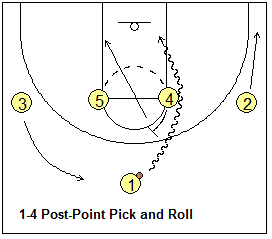
It’s a fact that in a series with a high chance of having several close matches, James will be the one to take the important shots in the closing minutes of the games. It is clear that he must be “hot”, so he has to be a part of the offence before that time. 1-4 High Stack, as well as screen the screener situation with Rivers giving the back screen in the middle lane are the ones that may open up paths for the explosive Panathinaikos guard. James’ consistency in efficiently taking important shots will be the key for Panathinaikos on this series.
Prediction
Close series. I have the feeling that as we go deeper in the series, productivity will become lower; on the contrary, tensions will be higher, as both teams will try to reach their best possible effort. This is the greatest challenge for coach Pascual and for the Panathinaikos organisation that are looking to return to the Final Four. Obradovic is the best coach to prepare a team for a playoff series. The guy plays at home even in “Hell”. It will be easier for Fener to get a road win at OAKA, than Panathinaikos a win in Istanbul. It goes without saying that the Turkish team has a better cohesive level as a team. However, the question arises whether they are able to match the energy and physical condition of the “Clover” in a “deep” series like this. Strictly 50-50…

The gates have just opened…
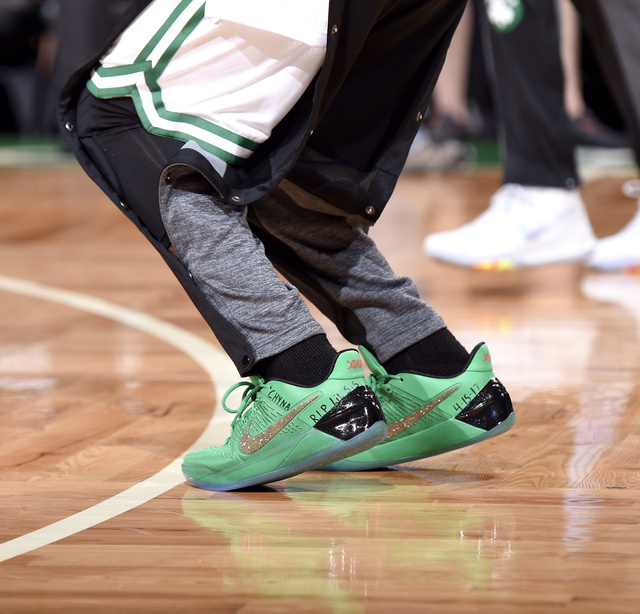
P.S. The shadow of death has been falling on the Celtics for years. Yesterday it happened once more in their game as the Bulls won every battle in the paint. There is a lot more in this series. Just like life IT…
By Jim Katsionis
Translated by: George-Orestis Zoumpos


